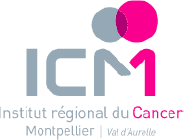Added value of liquid biopsy to tumour screening performed in the Molecular Tumour Board of PACA-East region.

Dr Esma SAADA, Medical Oncologist
Centre Antoine Lacassagne, Nice
Precision medicine aims to offer each patient the treatment adapted to his/her tumour characteristics. The development of high-throughput molecular tumour analysis has allowed the enrolment of patients in large molecular screening programs that suggested survival benefit conferred by targeted treatment to specifically selected patients (MOSCATO-01, PMID: 28365644).
The performance of such programs depends on the availability of tumour material, complete molecular analyses, and the access to clinical trials. For example, over the 1035 adult patients included in the MOSCATO-01 trial, tumour molecular analysis was not feasible for 1 out of 5 patients because of insufficient quantity or quality of tumour material.
The Molecular Tumour Board of PACA-East region (RTBmol) is a molecular screening program for advanced cancer patients treated into the REPOS Network (Réseau Essais Phases Précoces Oncologie Sud-Est). As of October 1, 2021, 1618 files have been discussed. The failure rates reported were 10% for unavailability of tumour material and 3% for non-effective molecular analysis.
These technical limitations could be overcome by analysis of circulating tumour DNA (liquid biopsy), which should better account for clonal heterogeneity and provide more accurate information on specificities of the dominant clone at the time of analysis. The performance of the most recent analysis techniques seems to meet the expectations of the molecular tumor board allowing high-throughput analysis of a panel of genes with targetable alterations.
Our objective is to compare the diagnostic value of liquid biopsy (NGS analysis) with analyses performed on solid biopsy in RTBmol, and to give patients from the PACA-Est area an equal chance to access these analyses opportunities.
The analysis of molecular anomalies on circulating tumour DNA will be performed on patients’ blood samples. This new approach should allow to perform molecular analyses for patients with poor quality (bone metastases, old samples) or not available (exhausted material) samples and to avoid problems related to inter and intra-tumour heterogeneity. Molecular analyses performed on tumour material (less than 3 years old) will be used as comparators.
If the liquid biopsy efficiency is at least equivalent to analysis performed on archived material, this technique, which is reproducible and less invasive, could eventually replace analyses on tumour samples in RTBmol.







